The Focused Leader

A Primary task of leadership is to direct attention. To do so, leaders must learn to focus their own attention. When we speak about being focused, we commonly mean thinking about one thing while filtering out distractions. But a wealth of recent research in neuroscience shows that we focus in many ways, for different purposes, drawing on different neural pathways—some of which work in concert, while others tend to stand in opposition.
Leadership Skill
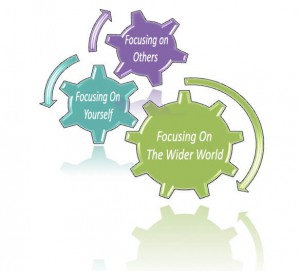
Grouping these modes of attention into three broad buckets sheds new light on the practice of many essential leadership skills. Focusing inward and focusing constructively on others helps leaders cultivate the primary elements of emotional intelligence. A fuller understanding of how they focus on the wider world can improve their ability to: Devise Strategy, Innovate, and Manage Organisations.
Every leader needs to cultivate this triad of awareness, in abundance and in the proper balance, because
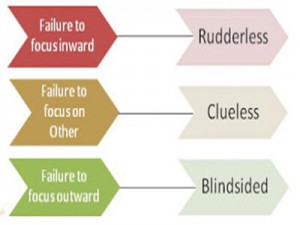 Focusing on Yourself
Focusing on Yourself
Emotional intelligence begins with self-awareness—getting in touch with your inner voice. Leaders who heed their inner voices can draw on more resources to make better decisions and connect with their authentic selves. But what does that entail? A look at how people focus inward can make this abstract concept more concrete.
Self-Awareness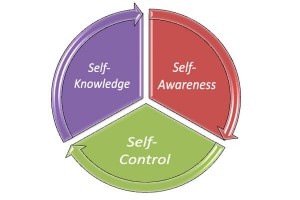
The voice is a matter of paying careful attention to internal physiological signals. How well people can sense their heartbeats has, in fact, become a standard way to measure their self-awareness. How well people can sense their heartbeats has, in fact, become a standard way to measure their self-awareness.
Zeroing in on sensory impression of ourselves in the moment is one major element of self-awareness. But another is critical to leadership: combining our experience across time a coherent view of our authentic selves.
To be authentic is to be the same person to others as you are to yourself. In part that entails paying attention to what others think of you, particularly people whose opinions you esteem and who will be candid in their feedback. A variety of focus that is useful here is open awareness, in which we broadly notice what’s going on around us without getting caught up in or swept away by any particular thing. In this mode we don’t judge, censor, or tune out; we simply perceive.
Leaders who are more accustomed to giving input than to receiving it may find this tricky. Someone who has trouble sustaining open awareness typically gets snagged by irritating details, such as fellow travellers in the airport security line who take forever getting their carry-on’s into the scanner. Someone who can keep her attention in open mode will notice the travellers but not worry about them and will take in more of her surroundings.
Self-knowledge
Of course, being open to input doesn’t guarantee that someone will provide it. Sadly, life affords us few chances to learn how others really see us, and even fewer for executives as they rise through the ranks. That may be why one of the most popular and over-enrolled courses at “Harvard Business School” is Bill George’s Authentic Leadership Development, in which George has created what he calls True North groups to heighten this aspect of self-awareness.
Groups are based on the precept that self-knowledge begins with self-revelation. Accordingly, they are open and intimate, “a safe place,” George explains, “where members can discuss personal issues they do not feel they can raise elsewhere—often not even with their closest family members. What good does that do? We don’t know who we are until we hear ourselves speaking the story of our lives to those we trust,” George says. It’s a structured way to match our view of our true selves with the views our most trusted colleagues have—an external check on our authenticity.
Self-control
“Cognitive control” is the scientific term for putting one’s attention where one wants it and keeping it there in the face of temptation to wander. A colloquial term for it is “willpower.”
Cognitive control enables executives to pursue a goal despite distractions and setbacks. The same neural circuitry that allows such a single-minded pursuit of goals also manages unruly emotions. Good cognitive control can be seen in people who 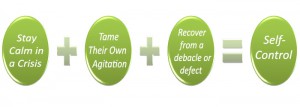
Executives who can effectively focus on others emerge as natural leaders regardless of organisational or social rank.
Tests of willpower by the psychologist Walter Mischel’s experiment on children statistical analysis showed that a child’s level of self-control was a more powerful predictor of financial success than IQ, social class, or family circumstance.n: 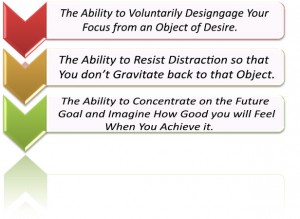
How we focus holds the key to exercising willpower, Mischel says. Three sub-varieties of cognitive control are at play when you pit self-restraint against self-gratification
Focusing on Others
The word “attention” comes from the Latin attendere, meaning “to reach toward.” This is a perfect definition of focus on others, which is the foundation of empathy and of an ability to build social relationships—the second and third pillars of emotional intelligence.
We talk about empathy most commonly as a single attribute. But a close look at where leaders are focusing when they exhibit it reveals three distinct kinds, each important for leadership effectiveness:
- Cognitive empathy—the ability to understand another person’s perspective;
- Emotional empathy—the ability to feel what someone else feels;
- Empathic concern—the ability to sense what another person needs from you.
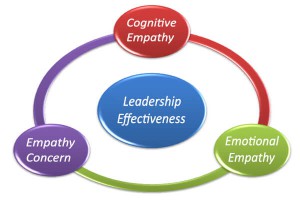 Cognitive empathy enables leaders to explain themselves in meaningful ways—a skill essential to getting the best performance from their direct reports. Contrary to what you might expect, exercising cognitive empathy requires leaders to think about feelings rather than to feel them directly.
Cognitive empathy enables leaders to explain themselves in meaningful ways—a skill essential to getting the best performance from their direct reports. Contrary to what you might expect, exercising cognitive empathy requires leaders to think about feelings rather than to feel them directly.
An inquisitive nature feeds cognitive empathy. As one successful executive with this trait puts it, “I’ve always just wanted to learn everything, to understand anybody that I was around—why they thought what they did, why they did what they did, what worked for them, and what didn’t work.” But cognitive empathy is also an outgrowth of self-awareness.
The executive circuits that allow us to think about our own thoughts and to monitor the feelings that flow from them let us apply the same reasoning to other people’s minds when we choose to direct our attention that way.
Emotional empathy is important for effective mentoring, managing clients, and reading group dynamics, It is about to feel fast without thinking deeply.
They tune us in by arousing in our bodies the emotional states of others: I literally feel your pain. Our brains patterns match up with yours when I listen to you tell a gripping story. A study says that you need to understand your own feelings to understand the feelings of others.
Accessing your capacity for emotional empathy depends on combining two kinds of attention: a deliberate focus on your own echoes of someone else’s feelings and an open awareness of that person’s face, voice, and other external signs of emotion.
The empathic concern, which is closely related to emotional empathy, enables you to sense not just how people feel but what they need from you. It’s what you want in your doctor, your spouse and your boss.
Empathic concern has its roots in the circuitry that compels parents’ attention to their children. Watch where people’s eyes go when someone brings an adorable baby into a room and you’ll see this mammalian brain centre leaping into action.
Research suggests that as people rise through the ranks, their ability to maintain personal connections suffers.
Empathic concern is a double-edged feeling. We intuitively experience the distress of another as our own. But in deciding whether we will meet that person’s needs, we deliberately weigh how much we value his or her well-being.
Focusing on The Wider World
Leaders with a strong outward focus are not only good listeners but also good questioners. They are visionaries who 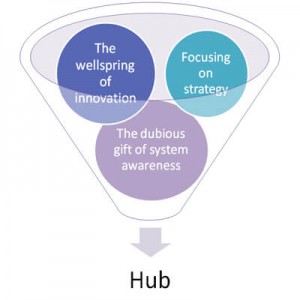 can sense the far-flung consequences of local decisions and imagine how the choices they make today will play out in the future. They are open to the surprising ways in which seemingly unrelated data can inform their central interests.
can sense the far-flung consequences of local decisions and imagine how the choices they make today will play out in the future. They are open to the surprising ways in which seemingly unrelated data can inform their central interests.
“A wealth of information creates a poverty of attention.”:Herbert Simon
The wellsprings of innovation
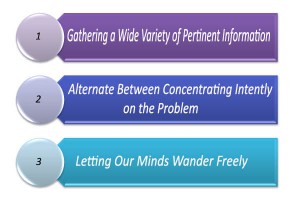 In an era when almost everyone has access to the same information, new value arises from putting ideas together in novel ways and asking smart questions that open up untapped potential. Moments before we have a creative insight, the brain shows some kind of deflection.It is suggested that what’s happening is the formation of a new neural network—presumably creating a fresh association.
In an era when almost everyone has access to the same information, new value arises from putting ideas together in novel ways and asking smart questions that open up untapped potential. Moments before we have a creative insight, the brain shows some kind of deflection.It is suggested that what’s happening is the formation of a new neural network—presumably creating a fresh association.
A classic model of creativity suggests how the various modes of attention play key roles.
Conclusion
A focused leader is not the person concentrating on the three most important priorities of the year, or the most brilliant systems thinker, or the one most in tune with the corporate culture.
Focused leaders can command the full range of their own attention: They are in touch with their inner feelings, they can control their impulses, they are aware of how others see them, they understand what others need from them, they can weed out distractions and also allow their minds to roam widely, free of preconceptions.
It takes is not talent so much as diligence—a willingness to exercise the attention circuits of the brain just as we exercise our analytic skills and other systems of the body.
The link between attention and excellence remains hidden most of the time. Yet attention is the basis of the most essential of leadership skills
Leave a Reply